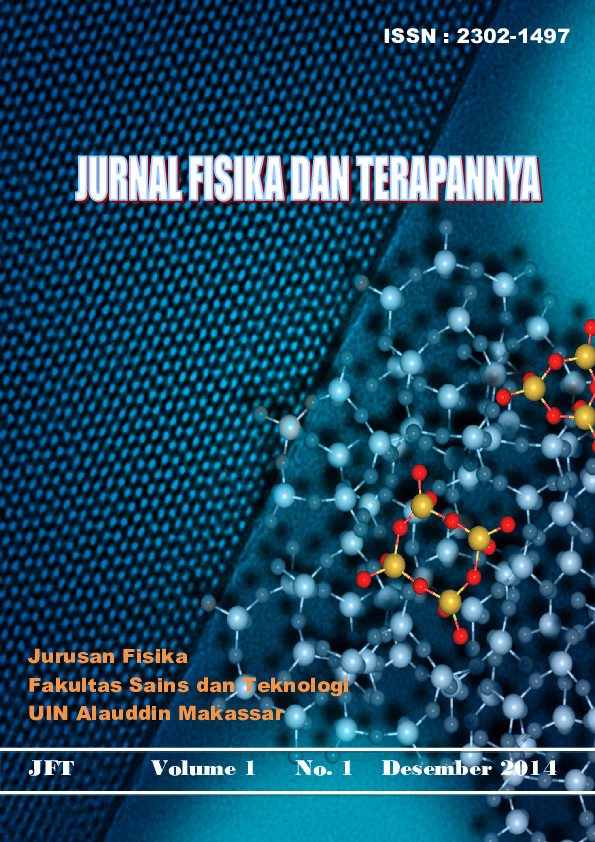ANALISIS SISTEM KERJA FLUIDA PADA INFUS BAGI PASIEN ANAK-ANAK, DEWASA DAN LANSIA
Abstract
This research was conducted at the hospital. Level II Pelamonia Makassar South Sulawesi. Formulation of research problems, namely (1) determine the ratio between the pressure fluid infusion and blood pressure for patients with discharge or severe nutrition in children, adults and the elderly, and (2) determine the flow rate of fluid infusion for patients experiencing discharge or severe nutrition in children children, adults and elderly. In this study the parameters under study is a comparison of blood pressure measured by a sphygmomanometer with intravenous fluid pressure in pediatric patients, the mature and elderly, as well as the flow rate of fluid infusion for pediatric patients, adults and the elderly who experience severe fluid and nutrients. Comparison of the patient's blood pressure and infusion pressure and flow rate of intravenous fluids known through calculation of several variables that have been measured and calculated. The results showed that (1) measured blood pressure values corresponding with the calculated pressure fluid infusion in pediatric patients, adults and the elderly based on the events of osmosis and (2) the flow rate of intravenous fluids to children gained an average of 6.669×10-9 m3/s (on the calculation of Q = A.v) or an average of 5.558×10-9 m3/s (on the calculation Q = V/t), while adults and the elderly gained an average of 2.001×10-8 m3/s (calculation result Q=Av) or 1,667×10-8 m3/s (on the calculation Q=V/t). This means that the flow rate of fluid infusion for pediatric patients less than the infusion flow rates for adults and the elderly.Downloads
References
Akhmad Zainuri, dkk. Eeccis, Volume 6 No. 1 (Juni 2012) hal. 49 (Diakses 3 Januari 2014).
Andi Murnidah. Terapi Intravena Pemasangan Infus. (Diakses 23 Desember 2013).
Fisikadedek.Blogspot.com/2013/05/fluida-statik dan dinamik. (Diakses 3 Januari 2014)
Goodner, Brenda. Panduan Tindakan Keperawatan Klinik Praktis. Jakarta: EGC. 1994.
Institut Pertanian Bogor (IPB), http://web.ipb.ac.id/~erizal/mekflud/ modul1.pdf. (Diakses 7 Januari 2014)
JNC-VII. The Joint National Committee on Detection, Evaluation and Treatment of High Blood Pressure. 2003.
Joyce James, dkk. Principles Of Science for Nurses. Jakarta: EMS. 2008.
Karim. Tekanan Darah. Medical Journal of Lampung. 2010.
Kusukakimia.blogspot.com, 2013 (Diakses 7 Januari 2014)
LaRocca, Joanne C. Terapi Intravena. Jakarta: EGC. 1998.
Mochammad Imamuddin. Peranan Air dalam Perspektif Al-Qur’an (Air Sebagai Sumber Kehidupan): EL-Hayah Volume 3 No.1. 2012.
Muhfari.’’http://muhfari.files.wordpress.com/2011/11/fluida-dinamis.pdf (Diakses 7 Januari 2014).
Tedyagung. Fluida Dinamis. http://tedyagungc.files.wordpress.com/2010/09/ Pertemuan-3-fluida-dinamis.pdf (Diakses 7 Januari 2014).
Reni Kimia. Tekanan Osmosis. Worlpress.com (Diakses 3 Januari 2014)
Ridwan. Karakteristik Aliran Fluida, (Diakses 7 Januari 2014) WHO2011: JSH. 2010.
Young Hugh D, Freedman Roger A. Fisika Universitas. Edisi X Jilid I. Jakarta: Erlangga. 2002.


